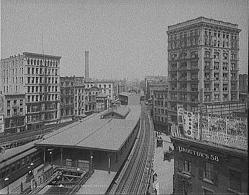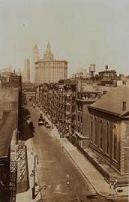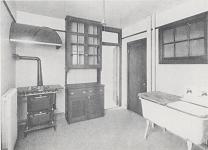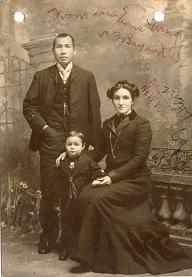THE EDUCATION OF ROSE DAWSON: PART
II
Chapter Eight
Acculturation
Rose followed
After leaving
the butcher shop, they went several stores down to a vegetable stand, where
Jenny picked out some carrots, potatoes, and two types of vegetable Rose had
never seen before. Then they continued south on Mott until it ended at a
junction of streets called
They slowly
crossed
Manure.
This time, Rose
caught sight of a small pile of it next to a fire hydrant just as she stepped
on the curb after crossing to the southeast corner of
Jenny was the
next to spot her misfortune, and she reached for her canteen again, only to
find that no more water remained inside. There was also no grass on which to
step.
Fortunately for
Rose, the rain had left some fresh puddles in the sidewalk’s shallow craters.
“Try cleaning your shoe in one of them,” suggested Jenny. Rose followed her
advice, and most of the droppings washed off. “We’ll take care of the rest at
home,” said Jenny.
I never imagined that walking the streets of the
*****
They continued
east until they reached a narrow passage called
“Hey, Vallon!”
The three turned
to see a large colored man – half a head taller and perhaps half again as thick
as
“Yeah, I saw it
happen from all the way across the street,” said Sam jovially as he looked at
Rose, who blushed, but soon recovered.
“How do you do, Miss Dawson?” said Sam as he extended his big hand
to Rose.
Rose gracefully
shook Sam’s coarse and beefy hand, which had evidently endured much hard labor.
“Quite well, Mr. Cole, if you discount this recent misfortune. But please call
me Rose.”
“Only if you call me Sammy.”
“All right, then, Sammy.”
“How’s the shoe?”
“It will survive, I think.”
“Of course it
will. You was lucky, Rose, believe it or not. That
must have been left by some stray mutt, but many dog owners let their animals
do it, too. The streets here are filthy, but cleaner than twenty years ago,
when they was filled with that stuff. People just
tossed it out their windows and sometimes hit you in the face. Children even
played in it.”
Rose flinched at
Sam’s depiction of such seemingly uncivilized behavior. Life is rather different in the
“Sammy’s worked
as a street cleaner, so he’s seen it all,” explained
“That’s how I
treat all my elders – like my mama taught me,” said Sam before he turned to
greet Jenny. “And how do you do, Mrs. Vallon? How’s
the face right now?”
“Not much different from this morning,” quipped Jenny.
“Rose is quite
new to the city. Jenny and I was of some help to her
yesterday,” said
“You mean the
fight at
“Sammy’s also a
semi-professional boxer,” said
Jack again. “No, I did not
know that,” confessed Rose as she continued to eye Sam politely. “You would
have made a wonderful ally, Sammy.”
“And I owe it
all to Vallon right here. He taught me many moves.
You saw him fight yesterday. He’s good!”
“He most certainly was,” said Rose, looking at
Sam sized up Rose. “Hmm, I don’t know, Vallon.
What you think?”
“I saw Rose punch the trickster. She’s got potential, but first,
she needs to improve her footwork technique.”
As usual, Jenny issued a light slap to her husband’s arm to get
him to stop teasing Rose. “We’re inviting Rose over for supper. Care to join
us, Sammy?”
“Not today, Mrs.
Vallon. I have to help someone move something. But
I’ll be sure to stop by and check on yous tonight.”
*****
They continued
down Catherine as Sam went in the opposite direction. Two blocks later, they
turned east on



(L)
“April showers
will bring May flowers,” assured Rose. Just as she had finished speaking, a
large cockroach darted past her feet and out the door. Just like her encounter
with the rat in Titanic’s Third Class
general room, she jumped back at the sight of this critter. But this time, she
did not scream in terror. The only voice to be heard was that of
Still,
“Yes, and I am
sure it will not be the last,” replied Rose, as she recovered pretty quickly.
“Don’t worry
about them. Next-door neighbors just moved, so they come over here to look for
food.”
Rose studied the
apartment. It was very small – not much bigger than her bedroom in
Jenny told her
to take off her shoes before leading her to the toilet in the back of the
apartment, after which she took Rose’s dirty shoe to the bathtub in the kitchen
to give it a thorough cleaning. After Rose finished her business, she returned
to the kitchen and examined the tiny apartment in greater detail. The most
unusual feature was obviously the location of the bathtub.
“Now that’s a real convenience,” said Jenny, aware that Rose was
transfixed by the bathtub.
“A bathtub in the kitchen?”
“No,
the indoor plumbing. Better for me to clean your shoe.
We didn’t have flush toilets and wash basins that drained by themselves when I
was your age. The electricity and gas stove are pretty recent, too. And, yes,
the bathtub is nice as well.”
“Would its location here…inconvenience you?”
“Not if you
compare it to the old days of having to go outside to wash and risk being seen
by strangers, or worse. That’s if we washed at all.”
Rose was
slightly taken aback by Jenny’s disclosure that people did not always bathe
decades earlier. This, combined with Sam’s description of how much filthier
*****
“Take a seat,
Rose,” said
Rose sat down
before answering. “The bathroom facilities were…more enhanced.” But life was not always better if you equate
better with happier.
“Things have
improved since we was yer
age, but slowly. Now, they don’t call us Irish a dirty, diseased people as much
as before. They reserve that for those who came after us – the Italians, the
Jews, the Poles, and especially the Chinese.”
“Why
the Chinese?”
“The Chinese was
much like us – fleeing their country in large numbers because it couldn’t feed
them all. When they came, they faced all the prejudice we had to face – and
worse. At least we could blend in with the white population. When times got
tough, and they was tough in the Seventies, many of us
blamed the Chinese, especially in
Alien. That word best described Rose’s perception of the Chinese,
but this stemmed from her lack of practical exposure rather than a deliberate
attempt to shun them. In fact, most of what she knew about the Chinese before
the sinking she learned from reading a couple of Mark Twain’s works: a book and a play, the latter of
which he co-authored. Both made the Chinese seem more like visitors from
another world than fellow inhabitants of this one. Despite Twain’s
progressivism and general sympathy for the Chinese, Rose conjectured that these
works, while interesting, pigeonholed and did not provide an informative
picture of them. They were also not her favorite Twain productions, which was
why she donated them to the university libraries in
“Almost. Some returned to
“Whatever became
of ‘Give me your tired, your poor, your huddled masses
yearning to breathe free’?”
Jenny, who had
started to prepare supper in the background and had overheard every word of the
conversation, let out an amused laugh. “Shouldn’t it be ‘wretched refuse’?”
“Is there a
difference?”
“No, I guess
not.”
Rose,
despite being unpleasantly surprised at this ignoble act on her country’s part,
found
“If only it was
always that funny,” continued
“The…tongs?”
“Right. Mock Duck’s
kind of people. What the government didn’t understand was that the more it shut
the Chinese out from the rest of society, the more they’ll rely on and enrich the tongs. They’re criminals, for sure, but they know
what their people want. That’s why there are tong wars and people die – to
control the supply of what people want. And in the rare instances the
authorities investigate a crime, say a murder, in
“Does this
contribute to the impression that
“Yes, and that’s
unfair, just as it’s unfair to lump all Irish in as drunks or gangsters. The
press comes out with stories of ‘John Chinaman’ eating rats, smoking opium,
waging gang warfare—” Amsterdam immediately stopped after seeing Rose’s face
turn nauseous at the mention of the Chinese consuming such a ubiquitous pest.
“Sorry, Rose. I
was carried away again.”
Rose gave him an
encouraging smile. “I am fine,
“The saying goes
that the Chinese eat anything that moves and almost anything that doesn’t. If
they do eat rats, how different is that from white country bumpkins who eat
squirrels, which I’ve seen? The two are almost the same, except one has a bushy
tail, while the other has a long, whip-like tail. As for opium – you think
white folks don’t smoke or trade in it? Nonsense! And I don’t have to tell you
about gangs.”
“Yes, I have
read about the Chinese washing clothes here for a living,” said Rose, recalling
what Twain wrote about them. “So, how did their men
find love and companionship?”
“The Chinese can
be quite clever in this regard. Some married white women and even took their
wives’ surnames. Irish women was an especially good
match because there wasn’t enough Irish men in this country. So, bang! A
perfect fit.”

An interracial Chinese-Caucasian family in the
Rose laughed
again. “This is all very fascinating.”
“The Chinese
wish they could say the same. Their heads was filled with stories of gum saan, or
“But why would
some Chinese exploit their own rather than unite with them to fight for a
better life for all Chinese in this country?”
“Money and
advantage, that’s why. And it’s not just the Chinese. We Irish ain’t above preying on our own either, and the rich are
only too happy to let us do that and fight the other groups when we should all
be cooperating. Even the unions pitted the Irish against the Chinese, and many
Irish was only too glad to oblige. This was so true in
“McGloins?”
“Oh, Charles McGloin was once a Rabbit. After my father died, he ran
with Bill even though Bill never fully accepted him. Then he was killed by
Union troops during the riot.”
“And regrettably
so,” interjected Jenny in the background.
“That’s one
reason why we left
“Was there
nothing good about
“I do not know.
Why?”
“Because
Rose was
confused at first, but then realized that
“That’s right.
So what if the weather’s nicer in
There was a
touch of disillusionment in Rose’s face, which Jenny noticed. “Don’t get Rose’s
hopes down like that,” she admonished her husband. “She should still go to
“Well, don’t let
me discourage you, Rose. Saints and scalawags and Mother Nature’s wrath abound
everywhere. Just be careful. I think you’ve heard that many times already.”
“Yes, I have,
but thanks. Clearly your memory of the Five Points also contributed to your
decision to come back.”
“We was a little
homesick, and the Five Points was home, no matter how bad its name.
“How is that?”
“Take Sammy, for
example. He’s the grandson of Jimmy Spoils. Jimmy fathered a daughter before he
died, and that daughter became Sammy’s mother. I didn’t know this until after I
returned to
Rose was awed by
this tale, not only by the reunion that occurred, but also by the length of
time that elapsed between encounters, even if it was only with a picture.
“I told Sammy I
felt responsible for Jimmy’s death because I didn’t let him join us for our
fight. I’d kept this guilt inside me all those years and had to release it. But
Sammy’s so forgiving. He said his grandmother told him everything – it was the
rioters’ fault. I said the fault was mine, but he insisted his grandmother was
right.”
“That was very
generous of him.” Rose stood up and stretched out. “Wow, forty-two years is so
long.”
“It seems that
way when you’re young,” said
“Maybe I can
wait until 1954.” If I
live that long. “Until then, I have to give meaning to each day I am
here in this world, and that means living my life to the best of my ability.”
“I think you
will, but I don’t expect to be around to see most of it.”
“